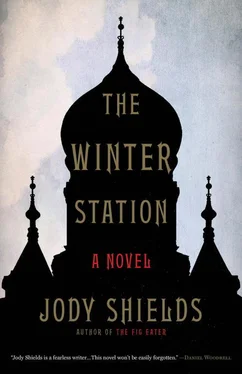Jody Shields
THE WINTER STATION
In memory of
Crispin Tobey
Debra K. Turner
There is no brushstroke that is not a detour.
— Shi Buhua
When Andreev said two bodies had been discovered outside the Kharbin train station, the Baron had an image of the dead men sprawled against snow, frozen in positions their bodies couldn’t hold in life. His focus sharpened on Andreev’s face, faintly pink, only the triangle of his eyes, nose, and lips visible surrounded by the rough hood of his sheepskin coat. It was noon and the sun already cast the faint blue haze of twilight that was particular to this place in September. The sun would set in less than three hours and the temperature would hover near zero.
The Baron’s breath exploded into a cloud in the freezing air. “Exactly where were the bodies found?”
“Alongside the train tracks.” Andreev’s arm waved in the direction of Central Station just behind them. “Somewhere between the tracks and the train station.”
“Who told you?”
“A contact who works for the railroad. He traveled here on the last train from Mukden to Kharbin.”
Mukden was two hundred verst away, a walled city, once the ancient imperial capital of Manchuria, since eclipsed. “Is your contact reliable?”
“As death.”
“When did he see the bodies?”
“A day ago.”
Frozen solid and covered with snow, the bodies could have remained undetected for weeks. Or until May, when the snow melted. Or until discovered by wild dogs or wolves.
“He watched soldiers put the bodies on a cart at night. Their lanterns were covered. No witnesses but my Mukden informer.”
“Strange.” If Andreev’s report was true, some official had given orders to the lowest-level police about the bodies. He built the scene in his imagination to block the dark chink of evidence that the investigation had happened in secret. Why hadn’t he been notified? He was the city’s chief medical examiner and a doctor at the Russian hospital, only two streets away from where the bodies had been found. He should have been consulted or signed a death certificate. He was self-conscious about his lack of information as Andreev watched him, measuring his response. It was necessary to keep up a façade in front of Andreev, to maintain the tinsel appearance of a link to powerful General Dmitry Khorvat, the czar’s administrator. The general ran the city like a private business, with absolute authority over all Russian military and civil matters in Kharbin. The Baron owed his appointment to Khorvat and kept it only at his pleasure.
In medical school on the Universitetskaya Embankment in St. Petersburg, the Baron had learned a methodology for diagnosis: the dissector must learn to discern order. First, establish the facts of how the Russians had managed the deaths. “No bodies were brought to the hospital. Nothing reported in the newspapers Molva or Russkoe Solve .” He made a dismissive gesture. “So I assume the dead were Chinese?”
“Yes.” The hood of Andreev’s jacket jerked up and down in confirmation.
“That explains the lack of official interest.” A dead Russian would have left an investigation, a vigil, memorial candles at St. Nikolas Cathedral. Unidentified Chinese were ignored in death. Kharbin was a divided city, laid out like a game board between the Chinese and the Russians. Perhaps the Chinese authorities had retrieved the bodies? Perhaps the dead were prominent Chinese, assassinated for a political motive? “Tell me, had clothing been stripped from the bodies?”
“Were they stripped? No. He didn’t say the bodies were naked.” Andreev’s voice revealed that he was puzzled by the question, but his answer was quick, information traded for a grain of praise from the older man, an aristocrat and son of a diplomat in the czar’s service.
Why two dead men near a crowded train station? A bold gamble. A risk of witnesses. There were easier places to leave bodies, as Kharbin was surrounded by the wilderness of the Manchurian plains. “The murderers must have a good alibi.” The Baron shifted his weight to keep his feet from becoming numb on the snow-covered ground.
“Or an alibi from soldiers who took the bodies.”
“What’s your picture of the crime, Andreev?”
“The men were tricked or forced onto the tracks. They fought the robbers who assaulted them. Later, their bodies were removed so as not to alarm other travelers and the Chinese authorities.”
You would choose an answer that was crooked, the Baron thought. There was no point in a search, as the exact location of the bodies was uncertain. The corpse movers would have churned the snow, added their own tracks, obliterated evidence. Two deaths marked only with words. He felt an obligation to continue the questioning. No one else would bother. There were no trained police or investigators in Kharbin, only soldiers and veterans who stayed after the war with Japan and were drafted into the Zamurskii District Special Border Guard Corps. They served Russia, the occupying power in Manchuria. The Russian soldiers coexisted with the Chinese and Japanese military, all waiting for an incident that would allow them to expand their presence in Kharbin. Perhaps the dead Chinese men would be that incident. “How close was your witness to the bodies?”
“He watched from the train window.”
“Did he notice blood by the bodies?” The Baron’s voice was neutral, but he began to wonder if Andreev himself had actually witnessed the discovery of the two corpses.
“Blood? No, it would have been too dark for him to see blood on snow. It was after three o’clock.” He exhaled.
Andreev’s breath wreathed around his head, and the Baron silently noted this indication of tension. In Manchuria’s harsh, cold climate, the breath was a visible sign that betrayed emotion more immediately than words. “True. We lose the light early these days.” He scrutinized the other man’s face for a moment too long and Andreev looked away, breaking eye contact.
The Baron would never have associated with Andreev in St. Petersburg, as he was lower class, a worker. It was unlikely they would ever have met. But in Kharbin, Andreev was a fellow Russian and necessary as a servant. He located anything for a fee. The man was flexible as curved script, with barbs that extended across the city, from the furriers on Kitayskaya Street to black marketeers, suppliers for potatoes, kerosene, Krupp pistols, silk for dresses, lanolin, French wine, writing paper. Andreev bartered, bought, and occasionally stole goods. There were always shortages, as everything was imported from Moscow, St. Petersburg, south from Beijing, Shanghai, west from Vladivostok and Port Arthur on the Pacific coast.
It was rumored that Andreev was a government informer, one of the numerous double and triple agents who served Russia in Manchuria, likely paid twice over for the same information about scandal and crime.
Self-possessed, Andreev had the guarded single-mindedness of a missionary or someone who had witnessed great cruelty. He divined the compass that others used. “The desire for possessions, for ownership, is the glue holding us together here in Kharbin. Not courage or love of the family or the czar or freedom,” Andreev had once explained. “Even the missionaries count the Chinese in church. The number of souls saved.” His voice had been scornful. Yet he had located frankincense for St. Nikolas Cathedral to replace a lost shipment and was deeply moved when the archimandrite blessed him for his work.
Читать дальше













